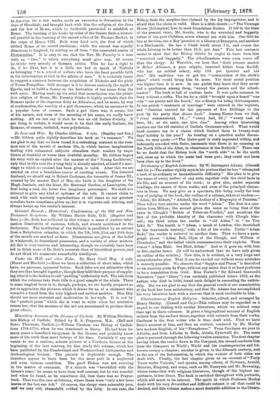Dictionary of English Literature. By W. Davenport Adams. (Cassell and
Co.)—The author rightly says in his preface that he has "attempted a task of no ordinary or inconsiderable difficulty." His plan is to give the name of. every author of any note, together with the chief facts in his life, and an account of his work ; to give also, under separate headings, the names of these works, and even of the principal charac- ters in them. We may give as a specimen, this being really the best way of judging of the book, the outline of a column, taken at random :— " Adair, Sir Robert," " Adelard, the Author of a Biography of Dunstan.' Then follow four entries under the word "Adam." The first is a quo- tation from Milton ; the second gives the name as being that of the tutor in Clough's " Bothie of Tober-na-Vuolich," and mentions the fact of the probable identity of the character with Clough him- self ; the third refers the reader to "old Adam" in " As Yon Like It." The fourth is "Adam, a monk of London, who flourished in the fourteenth century," with a list of his works. Under "Adam Bede," the reader is referred to another item. Then we have a para- graph about "Adam Bell, Clym of the Clough, and William of Cloudeslee," and the ballad which commemorates their exploits. Then comes " Adam Blair. See Blair, Adam." And so it goes on, with four or five similar items. (It will be understood that we have only given an outline of the articles.) Now this, it is evident, is a very large and comprehensive plan. That it can be carried out without some mistakes is scarcely possible. We observe that" Sappho and Phaon " is described as an amatory poem by Pope, without any notice that it at least professes to be a translation from Ovid. Miss Porter's "Sir Edward Seaward's Narrative " (not " Diary ") was certainly published before 1852, as the author, who died in 1850, found such delight in concealing the author- ship. But we are glad to say that the general result of our examination of the book has been satisfactory, and that Mr. Adams has accomplished his very laborious task with a success that is most creditable to him.


































 Previous page
Previous page